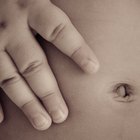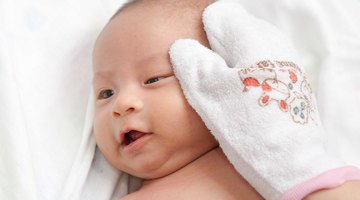My Baby's Top Lip Is Peeling
Your baby's skin is sensitive and prone to several skin conditions. Some may cause peeling on your baby's lip. These conditions usually are normal and may not require treatment.
However, in some cases, peeling blisters on your baby's face and lips may be a sign of an infection.
Call your pediatrician if your baby suddenly develops blisters or a rash on her face or other parts of the body. Never give your baby any medications, oral or topical, without consulting your doctor.
Nursing Tubercle
Babies can sometimes develop a blister, also known as a nursing tubercle, as result of vigorous feeding and sucking on a bottle or breast. The blister typically stiffens and thickens the skin and develops into a callus. The callus eventually peels off within days or in a few months.
The blister also may be present at birth due to vigorous thumb-sucking in the womb. A sucking callus should not cause any discomfort to your baby. According to “Parents” magazine, the overgrowth and stiffening of the skin in the lip may make grasping the nipple easier for your baby.
Eczema

Red Bumps Under an Infant's Chin
Learn More
Another condition that can cause peeling skin on your baby's face is atopic dermatitis or eczema. Atopic dermatitis causes dry and scaly skin that peels off or forms a fluid-filled bump.
Eczema often occurs in red patches on your baby's face but also can appear in the bends of the elbows and behind the knees, according to the American Academy of Pediatrics.
Mild eczema does not usually require a treatment but, based on the severity, the condition can be treated with over-the-counter creams. Consult your pediatrician about a treatment option for recurring eczema.
Impetigo
Some bacterial and viral infections also can cause peeling blisters around your baby's mouth.
Impetigo is a contagious skin infection that occurs around your baby's mouth, nose and ears.
The rash can occur as blisters that break easily and peel off, leaving behind a raw skin area that forms a honey-colored crust. Impetigo can be treated with oral or topical antibiotics.
Cold Sore

Red Bumps Around My Baby's Belly Button
Learn More
Cold sores are caused by a Herpes simplex virus, a common viral disease in childhood, according to the American Academy of Pediatrics.
Cold sores occur as blisters around your baby's mouth. When the blisters break, the skin peels off and leaves behind a raw sore that takes days to heal. Sometimes, your baby also can develop a fever, be irritable and lose her appetite. Treatment depends on the symptoms and may include antiviral medications, fever-reducing medications and mouth rinses. Never use any cortisone creams or lotions on the blisters.
Related Articles
- Parents: 12 Things No One Ever Tells You About Babies; Denise Porretto
- Caring for Your Baby and Young Child: American Academy of Pediatrics
- FamilyDoctor.org: Mouth Problems in Infants and Children










